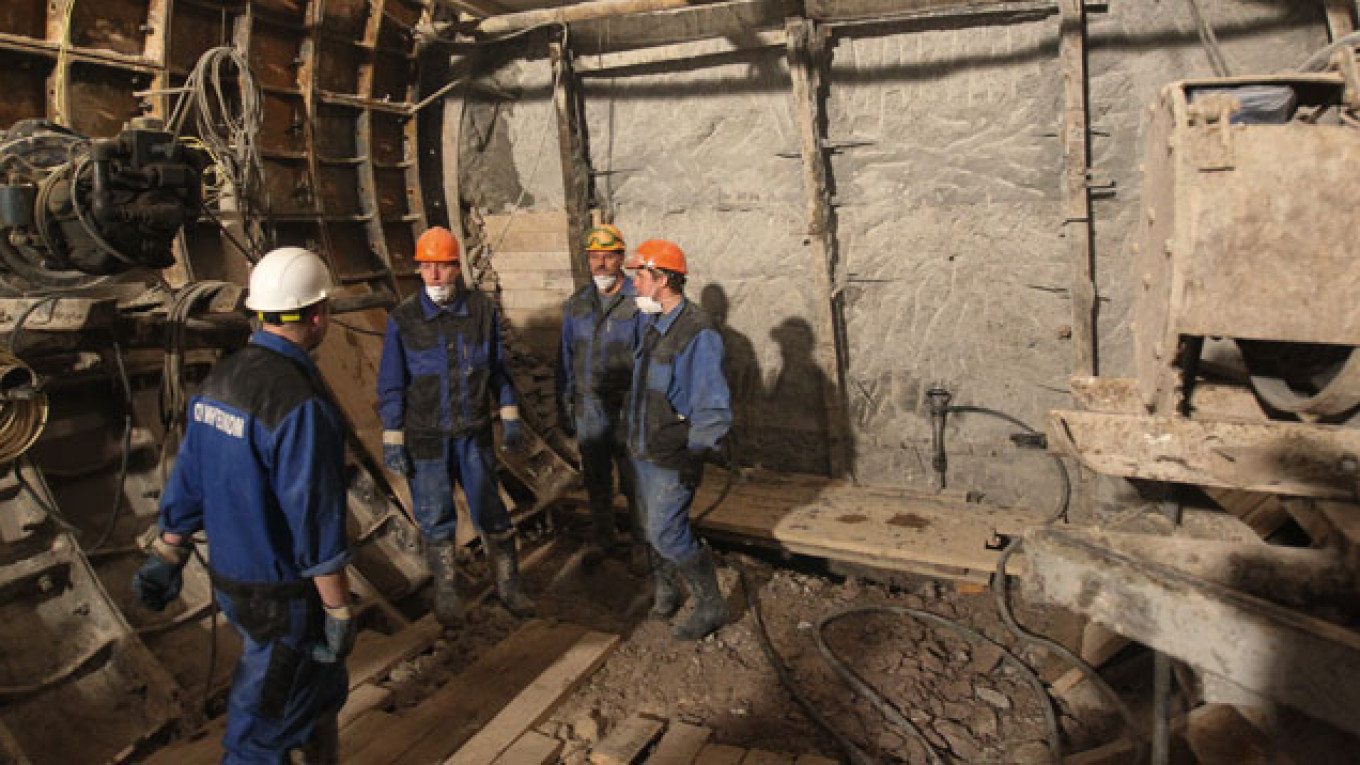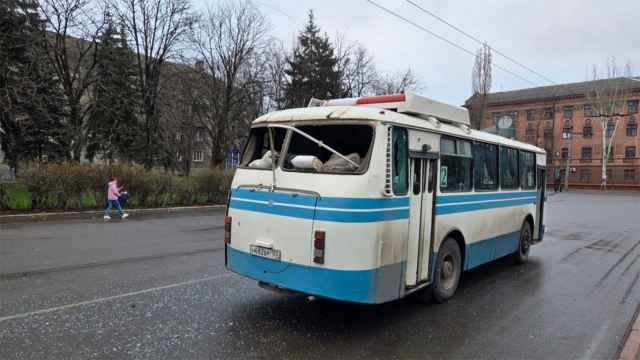In a striking symbol of Russia's recent economic pivot to the East, Chinese corporations have agreed to build a new line of the Moscow metro, and possibly up to 2 million square meters of accompanying real estate to boot.
The China Railway Construction Corporation, the China International Fund and Deputy Mayor Marat Khusnullin, representing state-owned construction management firm Mosinzhproyekt, all signed an agreement in Shanghai last week on cooperation in construction of a new metro line connecting Moscow to the southwestern territory of New Moscow.
The agreement was followed by a series of contracts signed with the Chinese during President Vladimir Putin's voyage eastward last week, as Russia seeks alternative markets and partners amid tension with the West incited by Russia's annexation of Crimea. The Russian-Chinese Investment Fund also last week declared its intentions to invest in building the first railway bridge linking the two countries, while state-controlled energy companies Gazprom and China National Petroleum Corp signed a long sought-after $400 billion gas deal.
During the same visit, Mayor Sergei Sobyanin signed a three-year cooperation agreement with the government of Beijing, claiming an urgent need for economic diversification away from the West. "Now the majority of direct foreign investment into the Moscow economy comes from European countries. I think that the economy must be more balanced," Sobyanin said in an interview on television channel Moskva-24.
The agreement will extend beyond metro construction, Khusnullin told The Moscow Times on Monday. "The idea is that the Chinese investors will organize investments in construction in the metro and in 2 million square meters of real estate: offices, residences, commercial property and so on," Khusnullin said.
It is through the sale of this property that investors will make back the capital they committed to the metro line, which will extend for nearly 15 kilometers from the planned station Ulitsa Navatorov to the region Kommunarka in New Moscow, covering between six and eight stations on the way. Construction of the metro will set investors back about $2 billion, but the real estate built along the metro line "could cost about $5 billion to $7 billion on the market," Khusnullin said.
A spokesman for Mosinzhproyekt, the company in charge of constructing the 79 new metro stations played by City Hall, on Monday said that so far only an agreement on participating in construction of the metro line has been signed. The details of the contract and the nature of the investment will be agreed on later, he said.
Along with the political message of the agreement, Moscow also stands to benefit in an entirely practical sense from China's proficiency in the rapid building of high-quality public transport systems, said Sergei Zuyev, dean of the School of Public Policy at the Russian Presidential Academy of National Economy and Public Administration.
In just 21 years, the Shanghai metro network has expanded to cover 538 kilometers and 329 stations — larger than Moscow's nearly 80-year-old equivalent. Under earlier plans the line to New Moscow was to built by 2018, but with the help of Chinese investors it could now be finished earlier, Khusnullin said.
"If the Chinese build as quickly in Moscow [as they have in Shanghai], it will only be a plus for us," Khusnullin said.
Speedier construction of the new line would also spur development of the New Moscow region that it will service. The city's ambitious plans for the region, announced in 2012, more than doubled the territory of Moscow. The project has already drawn in investments of $4 billion, with a total of $200 billion expected by 2035, according to a city government press release.
While not in itself sufficient, without the new metro line, development in the region would be impossible, said Zuyev, who also serves as head of an expert group on developing a plan for Moscow's social and economic development through 2025.
Beyond servicing the new region, expansion of the metro is also key to increasing Muscovites' standard of living. In contrast to other major world metropolises, Moscow's transportation grid is still insufficient to meet the needs of the populace, and expansion of the metro is "one of the most effective ways of solving that problem," Zuyev said.
Contact the author at d.damora@imedia.ru
A Message from The Moscow Times:
Dear readers,
We are facing unprecedented challenges. Russia's Prosecutor General's Office has designated The Moscow Times as an "undesirable" organization, criminalizing our work and putting our staff at risk of prosecution. This follows our earlier unjust labeling as a "foreign agent."
These actions are direct attempts to silence independent journalism in Russia. The authorities claim our work "discredits the decisions of the Russian leadership." We see things differently: we strive to provide accurate, unbiased reporting on Russia.
We, the journalists of The Moscow Times, refuse to be silenced. But to continue our work, we need your help.
Your support, no matter how small, makes a world of difference. If you can, please support us monthly starting from just $2. It's quick to set up, and every contribution makes a significant impact.
By supporting The Moscow Times, you're defending open, independent journalism in the face of repression. Thank you for standing with us.
Remind me later.






